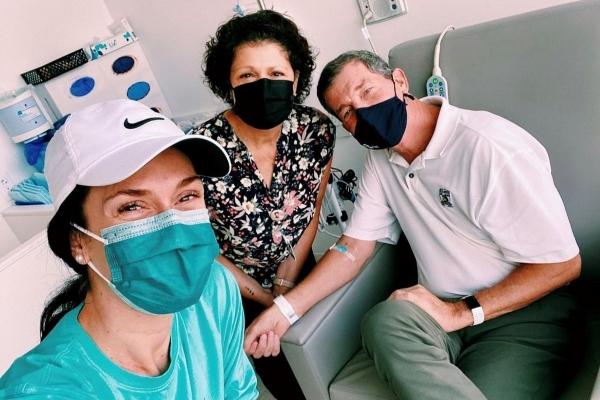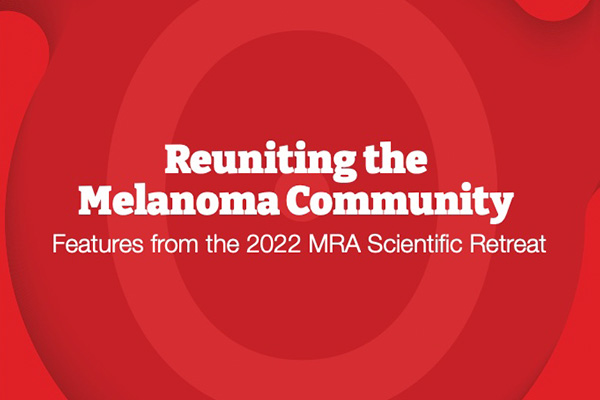News
From Melanoma Patient to Caregiver
By Renee Orcione, MRA Digital Engagement & Communications Manager | 11 November 2022 In Allies & Partnerships, Melanoma Stories, Prevention, Science, Treatment
By the time she was 26-years old, Leah Adams had spent countless hours tanning. Growing up in Ohio where the winters were long, she felt a pressure to stay tan far beyond the summer months, so she turned to tanning beds.
The Changing Melanoma Landscape
7 November 2022
Before 2011, the melanoma treatment arena was in a sustained drought during which patients were only offered a few treatments, and few with advanced stages of the cancer were still alive a year after starting treatment.
Facing Melanoma Together: Kate O'Neil
31 October 2022
Prior to the creation of modern melanoma therapies, Kate O'Neil's sister Noreen was diagnosed, treated, and ultimately passed away from the disease. To honor her sister's legacy, Kate has become a champion of melanoma research.
FDA Approves Opzulera for At-Home Therapy for Skin Repigmentation: What this Means for Melanoma Patients with Vitiligo
By Isabel Ryan, MRA Intern | 24 October 2022 In News, Science
On July 18th, the U.S. Food & Drug Administration (FDA) approved the first topically-applied treatment for skin repigmentation for patients with vitiligo after strong results from two Phase 3 trials. Vitiligo, a chronic skin disease, affects 3 in 100 people who have melanoma, categorized as melanoma-associated vitiligo. The approval invites patients with vitiligo, including those with melanoma, to talk with their providers on how Opzelura can serve their skin needs.
Music vs. Melanoma: 13-Year-Old Raises $6K for Research
By Renee Orcione, MRA Digital Engagement & Communications Manager | 7 October 2022
Cassidy Battin, an 8th grader from Carlsbad, California, and her family are no strangers to melanoma. Her great aunt sadly died of uveal melanoma, a rare subtype that forms in the eye, when Cassidy was younger. Her grandfather also had melanoma, along with several other loved ones in the family.
Fish & Melanoma: What’s the Connection?
By Cody Barnett, MPH, MRA Senior Director of Communications & Patient Engagement | 4 October 2022 In News
A study led by researchers at Brown University surprisingly found that people who ate the most fish were the most likely to develop melanoma. Before you change your diet, read more about the study, its findings, and limitations.
Mollie’s Fund Partners to Prevent Skin Cancers Among Firefighters
By Cody Barnett, MPH, MRA Senior Director of Communications & Patient Engagement | 8 September 2022 In Prevention
Every day firefighters put their own safety on the line to protect the lives and property of others. It’s a tough job that puts those who do it at increased risk for burns, smoke inhalation, and other injuries.
Overcoming Melanoma Treatment Resistance Research Update
24 August 2022 In Science, Treatment
About half of all patients given cancer immunotherapies do not respond to them, and although targeted therapies often dramatically shrink tumors in most patients, in about three-quarters of those patients, the treatments stop being effective weeks to months after initially killing tumor cells.
Improving AI Performance for People of Color: Diagnosing Melanoma & Other Skin Cancers
By Marc Hurlbert, PhD, MRA Chief Executive Officer | 12 August 2022 In Allies & Partnerships, Prevention, Science
The problem with the current state-of-the-art AI and image-based algorithms is that they have been developed using images of moles from light skinned (white) individuals. As a result, existing AI tools are not sensitive enough in people with darker skin. Dr. Albert Chiou, Clinical Associate Professor of Dermatology at Stanford University, the junior faculty member on the L’Oréal Dermatological Beauty Brands-MRA Team Science Award, and his colleagues are working to fix these shortcomings.
MRA's Latest Research Report: The Melanoma Research Community Reunites
11 August 2022 In Allies & Partnerships, Events, Melanoma Stories, News, Prevention, Science, Treatment
Each year, MRA brings together hundreds of people from across the melanoma research community to exchange ideas, report on scientific progress, celebrate achievements, and mourn our collective losses.










